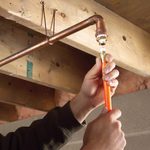Winterize Your Irrigation System With This Handy $15 Device

Winterizing your irrigation system each fall can set you back some serious money if you pay a service to do it. But you don’t have to.
Our editors and experts handpick every product we feature. We may earn a commission from your purchases.
Fall. The time of year to pick up leaves, fortify your house against the coming cold and winterize your irrigation system.
Blowing the water out of the irrigation lines is a crucial part of home maintenance. Once the temperatures start falling, water left in the lines can freeze and burst, costing you a lot of money in repairs. Every landscape service company has different charges which vary by location. In Minnesota, prices average around $80 to have your sprinkler system blown out each fall. That can add up.
On This Page
Winterizing Your Own System
It’s possible to blow out your system if you have the right equipment. First, you’ll need an air compressor. And it has to have enough volume to do it right.
In my situation, I had the air compressor, but no easy way to hook it up to the system. Some systems have air compressor fittings or blow out ports to hook up directly. Mine does not. I purchased the following parts to create my own blow out port:
- 1-in. x 3/4-in. PVC Schedule 40 Reducer Bushing ($1.97);
- 1/2-in. x 4-in. PVC riser (64 cents);
- 1/2-in. x 1/4-in. Galvanized Malleable Iron FPT x FPT Reducing Coupling ($2.28);
- 1/4-in Full Port Ball Valve ($8.38);
- 1/4-in. x 1/4-in. Male to Male Industrial Plug quick coupler ($1.41).
Connecting the Parts
Connect the above parts in order, securing them with thread seal tape. My system has a one-inch plug hole that connects to the device.
To blow out the water, charge up the air compressor and hook it up to the quick coupler end (make sure to close the ball valve). Once charged, open the valve and blow out each zone, one at a time until mist comes from the sprinkler heads. Close the valve in between each zone to charge up the compressor.
Several companies make devices for this purpose, but the ones I found only had 3/4-in. hookups. These devices are made for blowing out the water lines in RVs. I couldn’t find a device that would work at my local home store, so I assembled the above parts.

